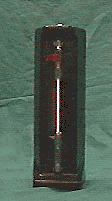Hydrogen Spectroscopy
Because we cannot see atoms directly, we must learn about them
through indirect observations. For example, light is emitted from gases
that are electrically excited. Thus the atoms in the gas are
involved in the process of emitting light. In this activity we
will look at this light and see what we can learn about the atom
from the properties of the light.
This is a tutorial that lets you explore the Hydrogen Spectra through pictures and programs
designed to show the physics of a single electron atom. Then this tutorial
moves beyond a general exploration to guide you through the concepts of Emission, Ionization
and Absorption.

Hydrogen Tube
|

Tube Turned On
|
TO NAVIGATE THE SITE
Use the outline provided here (this page only).
Use the next/back buttons.
Use the index found at the bottom of each page.
Tutorial:
[Pictures from Spectra
]
[Visible Spectra - Part A
] [Visible Spectra - Part B
]
[Full Spectra - Part A
] [Full Spectra - Part B]
[Graphing Analysis - Part A
] [Graphing Analysis - Part B
]
[Emission]
Further Information:
[Ionization
] [Absorption]
Reference Pages:
[Hydrogen Spectroscopy Index
] [
Visual Quantum Mechanics Home]
This project is supported by the National Science Foundation.
Opinions
are those of the project staff and not necessarily those of the Foundation.
Direct comments to
Kim Coy
© 1999, Physics Education Research Group
Department of Physics
Kansas State University

